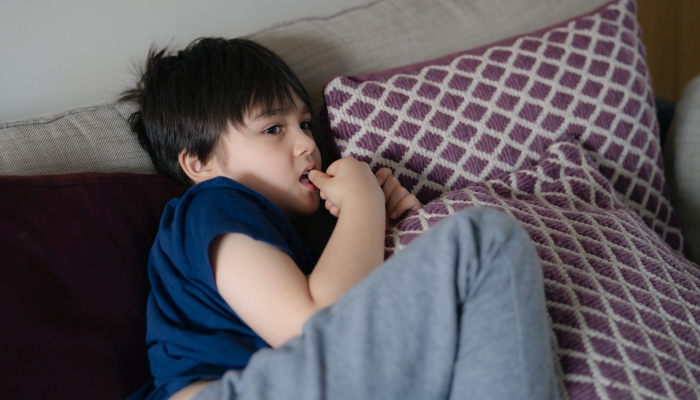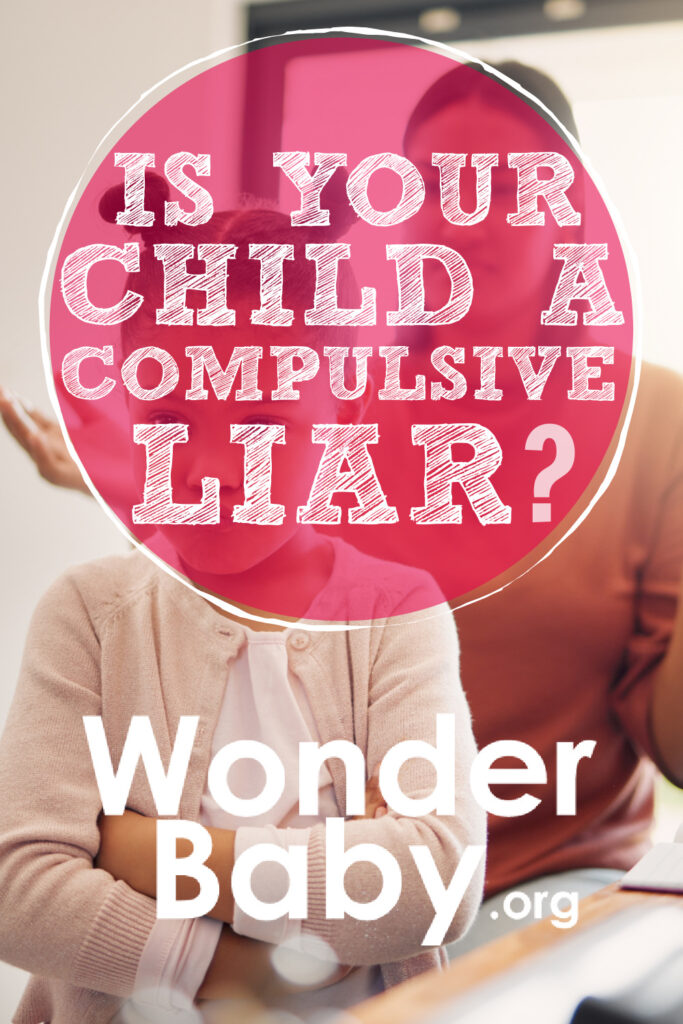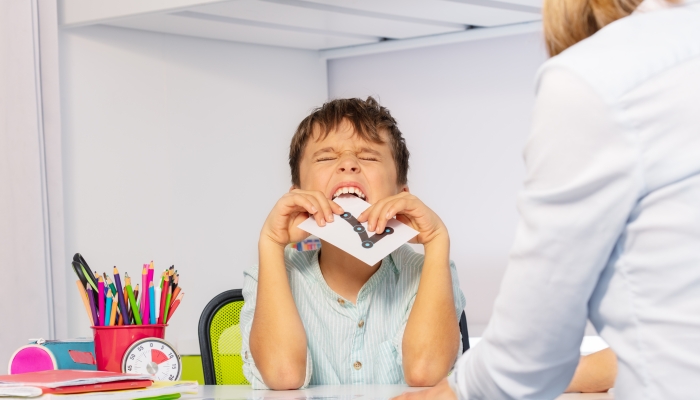Is Your Child a Compulsive Liar?

- Compulsive lying is when children lie despite consequences or evidence of their dishonesty.
- Compulsive lying develops out of habit or self-preservation.
- Parents can work to eradicate compulsive lying by developing consistent expectations, open communication, and modeling honest behavior.
- Rarely, compulsive lying is a symptom of a mental health diagnosis.
I once knew a boy who was often difficult to believe. His stories were incredibly outlandish, and the places he went to and his experiences were extravagant or extreme. He was always the hero in the story, and there was always a battle to be won.
He was a lovely boy and a good friend, but even at eight years old, I knew it was best to keep my distance because the stories he told made me feel like I couldn’t trust him.
Looking back on my childhood experience, I realize now that my friend was likely a compulsive liar. He didn’t seem to have any motive behind his lying, and he didn’t use his lies to manipulate me. He struggled to make friends, though, and may have used his lies to make himself feel likable.
Compulsive lying in children can be a bad habit that develops out of self-preservation. It can also sometimes be a symptom of an underlying mental health disorder.
Whatever the reason, there are signs of compulsive lying to keep an eye on, as this behavior can impact your child’s relationships. The good news is that there are also steps you can take to increase open communication and lessen your child’s tendency toward dishonesty.
Identifying Signs of Compulsive Lying

You most likely stumbled upon this article because you searched for information about compulsive lying in your child or a child you care for. Their constant fantastical storytelling or defensive lies have become so extensive that you have sought help about what to do next.
Identifying the behavioral, emotional, and social indicators will help you differentiate causes and concerns for the dishonest behavior you are seeing.
Behavioral Indicators
Child experts will tell you that some degree of dishonesty is average. The behavioral indicators that turn it into compulsive lying are when the lies become so great they contradict themselves or the unnecessary elaboration of tales causes the listener to be unable to follow the story any longer. An avoidance of eye contact or overemphasis on detail is also a strong indicator of compulsive lying.
Emotional and Social Indicators
No one wants a friend who always lies, which is why compulsive lying has a social impact on friendships and family relationships due to the lack of trust.
Lying also impacts a child’s emotional well-being through symptoms of anxiety or guilt. This may be nervous behaviors like nail biting or hair twirling or even physical symptoms like nausea or restlessness. The constant fear of being caught or punished limits a kid’s ability to relax and feel safe.
Understanding Compulsive Lying

Compulsive lying can be difficult to understand as a parent or caregiver when all you desire is an open and honest relationship with your child. Learning the characteristics, reasoning, and causes of compulsive lying can help develop empathy. This empathy will do wonders in creating a pathway for the relationship you crave.
Definition and Characteristics
Compulsive lying is different than typical lying behavior as it happens more frequently, has no identifiable cause, and continues despite consequences.
Other indicators to consider when discerning whether lying is problematic are whether the child is using her lies to manipulate others or if she seems dishonest more regularly than her peers.
Questions to consider are:
- Does she lie when in situations that are uncomfortable or unfamiliar?
- Which is he most regularly dishonest with—family, friends, or strangers?
- Will she acknowledge her lie when faced with evidence, or does she refuse to tell the truth no matter what?
- Is the nature of the lies fantastical or storytelling? Is the tone manipulative or coercive?
- How often is he lying? Daily? Weekly? Monthly?
Why Children Might Develop This Behavior
Lying and dishonest behavior in children can be exacerbating to caregivers. The first step to eradicating it is to determine what caused the behavior to develop in the first place.
Some reasons for compulsive lying include:
- Seeking attention or approval.
- Fear of punishment or consequences.
- Coping with stress or trauma.
- Modeling behavior from adults or peers.
Causes and Underlying Factors

There are several causes and underlying factors that contribute to compulsive lying. Understanding what might be leading to the problematic behavior is helpful in deciding how to tackle correcting it.
Developmental Factors
The tendency to lie develops in children around age 2 ½ to 3.11. Talwar, V., & Lee, K.. Social and Cognitive Correlates of Children’s Lying Behavior. Child Development. 2008;79(4), 866–881. https://doi.org/10.1111/j.1467-8624.2008.01164.x At this stage, the young brain can separate its thoughts into words, and children will then verbalize the thoughts running through their brains.
Many of these thoughts are fantastical or imaginative, and the untruths told at this age are often not malicious or calculated. This stage of childhood is trying to make sense of the world around them from the little facts and understanding they have.
When reciting the events of her day, your daughter may tell you she visited a castle and had tea with the queen. She did these things in her imaginative play but not in reality. Her “lie” is not intentional but a statement of how she views the facts.
A child’s ability to differentiate fact from fiction depends on brain growth. Their level of cognitive development impacts their ability to tell the truth since it interferes with their ability to separate what is true from what is false.
Other stage-specific challenges that impact a child’s level of honesty are asserting independence in toddlers or the need for autonomy in prepubescent children. It’s essential to understand where your child is developmentally so you can best understand how to address compulsive lying at every stage.
Environmental Factors
What children are exposed to in their environment leaks into their behavior. If their environments are filled with positivity, the behaviors are generally positive. If the environmental factors are overly negative, this breeds negative behaviors such as compulsive lying.
Inconsistent discipline or unpredictable household environments, such as housemates coming and going, unstructured routines, and consistent exposure to dishonest behaviors22. Hays, C., & Carver, L. J.. Follow the liar: the effects of adult lies on children’s honesty. Developmental Science. 2014;17(6), 977–983. https://doi.org/10.1111/desc.12171, can have a long-lasting effect on a child’s interpretation of morality.
Consistent positive influences and reliable moral structures will help any child develop an understanding of honesty, which is the best protection against behaviors like compulsive lying.
Psychological Concerns
According to Evans & Lee, in Emergence of Lying in Very Young Children33. Evans, A. D., & Lee, K.. Emergence of Lying in Very Young Children. Developmental Psychology. 2013;49(10), 1958–1963. https://doi.org/10.1037/a0031409, “Lying is a pervasive human behavior. Evidence suggests that from the age of 42 months onward, children become increasingly capable of telling lies in various social situations.”
Although developmentally normal, there are psychological diagnoses, such as oppositional defiant disorder (ODD) or conduct disorder, that can cause lying to become compulsive and, therefore, much more destructive.
The complexity of attention deficit hyperactivity disorder (ADHD) or autism spectrum disorder (ASD) can also lead children to be more apt to lie due to their lack of impulse control. A history of trauma or abuse can also cause compulsive lying since their “fight-flight-freeze” response is constantly triggered, and they will be looking to keep themselves safe no matter the circumstance.
Navigating the Challenge: Steps for Parents

Once the habit of compulsive lying has begun, the thought of stopping it can feel very daunting. Parents and caregivers get frustrated with the lack of trust and waste of time caused by dishonesty but feel helpless and hopeless about how to change it.
While not entirely within your control, as a parent you can take actionable steps to influence more honest behavior from your child by making a few simple changes and maintaining persistent action.
Open Communication
Open communication with your child is the first defense against compulsive lying. Research shows that children who do not feel safe communicating with their parents are more likely to engage in compulsive lying.
Creating a safe space for honesty means avoiding excessive punitive reactions toward dishonesty. Excessive punishment can fuel fear. This fear increases the tendency toward compulsive lying due to the urge to please and avoid punishment.
Consistency in Rules and Consequences
Avoiding excessive punitive reactions does not mean avoiding discipline. In actuality, it means following discipline guidelines that are clear, consistent, and established before the lying event takes place.
By establishing clear household rules and ensuring consistent consequences for dishonesty, your child will know what to expect for their dishonesty every time.
Positive Reinforcement
When talking to parents about changing unwanted behavior, I tell them not to underestimate the importance of positive reinforcement. Many people argue that it feels like they’re bribing their child to do the right thing, but I point out that when done right, it just changes the conversation from making the parent the “hammer” of discipline to a “cheerleader” for making good choices.
At times, we need to be the hammer of discipline. Still, any time you can be your child’s cheerleader, rewarding and acknowledging honest behavior will lessen the relationship’s power struggle.
There are many different ways to use positive reinforcement, such as:
- Clapping
- Dance party
- Stickers
- Hug or pat on the back
- Words of encouragement
- Identified prize
- Allow the child to choose dinner or music played
Remember, the goal of positive reinforcement is to emphasize the value of truthfulness.
Role Modeling
While your parenting style impacts your children, modeling good behavior significantly outweighs this impact. Children constantly observe the world around them and learn what is acceptable behavior by watching their caregivers behave44. Rymanowicz, K.. Monkey see, monkey do: Model behavior in early childhood. MSU Extension. 2015. https://www.canr.msu.edu/news/monkey_see_monkey_do_model_behavior_in_early_childhood in their own lives. From a child’s perspective, the value of a good role model cannot be underestimated.
Modeling honesty in day-to-day actions has as much impact on a child’s character development as any sticker chart, diet, or education plan. When a parent adheres to a strict code of honesty and is transparent about personal dishonest moments, it can contribute to the open communication needed in the parent-child relationship.
Seeking Professional Guidance

As already stated, lying is a normal part of childhood, and compulsive lying, although incredibly frustrating, is not necessarily cause for concern, as it is often born out of habit and self-preservation.
When accompanied by other symptoms, though, managing compulsive lying can require the help of doctors, counselors, therapists, or other professionals.
When to Seek Help
Continuing behavior despite consistent family interventions is a reason to seek professional guidance. Counselors and therapists can help identify what might contribute to the continued behaviors and offer advice on how to tailor the interventions to make them child-specific.
Compulsive lying and other concerning behaviors are another reason to seek professional help. These added behaviors could be a sign your child is dealing with a mental health diagnosis and could benefit from additional treatment.
Some concerning behaviors to pay attention to include:
- Stealing
- Memory loss
- Trouble at school
- Acting as if being driven by a motor
- Cognitive distortions
- High anxiety
Types of Therapeutic Interventions
There are several evidence-based approaches to addressing dishonest behavior in children. A mental health professional can help determine which therapeutic intervention will best address a child’s compulsive lying.
The most effective therapies often include:
- Cognitive behavioral therapy (CBT) for children: Addresses unhelpful thinking styles
- Family therapy: Addresses systemic issues or dynamics
- Trauma-focused play therapy: Addresses trauma-related lying
References
- Talwar, V., & Lee, K. (2008). Social and Cognitive Correlates of Children’s Lying Behavior. Child Development, 79(4), 866–881. https://doi.org/10.1111/j.1467-8624.2008.01164.x
- Hays, C., & Carver, L. J. (2014). Follow the liar: the effects of adult lies on children’s honesty. Developmental Science, 17(6), 977–983. https://doi.org/10.1111/desc.12171
- Evans, A. D., & Lee, K. (2013). Emergence of Lying in Very Young Children. Developmental Psychology, 49(10), 1958–1963. https://doi.org/10.1037/a0031409
- Rymanowicz, K. (2015, March 30). Monkey see, monkey do: Model behavior in early childhood. MSU Extension. https://www.canr.msu.edu/news/monkey_see_monkey_do_model_behavior_in_early_childhood

Related Posts

Behavior
Understanding Intermittent Explosive Disorder in Children
Are you worried about your child’s unexpected aggression and explosive behaviors? Learn how to support a child with intermittent explosive disorder.

Behavior
5 Emotional Regulation Activities for Kids
Want to teach your child how to regulate emotions? Here are emotional regulation activities for kids that can help!

Behavior, Special Needs
5 Tips for Dining Out with Children Who Have Sensory Sensitivities
Worried about dining out with sensory sensitivities? Try these tips for less stress and more fun the next time you take your family out to eat.